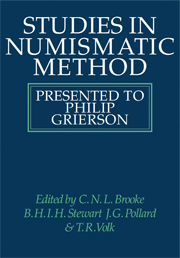Book contents
- Frontmatter
- Contents
- Acknowledgements
- Abbreviations
- Philip Grierson's contribution to numismatics
- A bibliography of the writings of Philip Grierson
- Introduction
- 1 Thoughts on the beginnings of coinage
- 2 The life of obverse dies in the Hellenistic period
- 3 Roman coinage of the Cyrenaica, first century bc to first century ad
- 4 Roman imperial coin types and the formation of public opinion
- 5 Coin hoards and Roman coinage of the third century AD
- 6 Belgian finds of late fourth-century Roman bronze
- 7 The re-use of obsolete coins: the case of Roman imperial bronzes revived in the late fifth century
- 8 Interpreting the alloy of the Merovingian silver coinagae
- 9 Carolingian gold coins from the Ilanz hoard
- 10 The novi denarii and forgery in the ninth century
- 11 On the rejection of good coin in Carolingian Europe
- 12 Ælfred the Great's abandonment of the concept of periodic recoinage
- 13 King or Queen? An eleventh-century pfennig of Duisburg
- 14 Personal names on Norman coins of the eleventh century: an hypothesis
- 15 The Gornoslav hoard, the Emperor Frederick I, and the Monastery of Bachkovo
- 16 Coinages of Barcelona (1209 to 1222): the documentary evidence
- 17 Finds of English medieval coins in Schleswig-Holstein
- 18 Privy-marking and the trial of the pyx
- 19 Judicial documents relating to coin forgery
- 20 Mint organisation in the Burgundian Netherlands in the fifteenth century
- 21 Coinage in Andrew Halyburton's Ledger
- 22 Imitation in later medieval coinage: the influence of Scottish types abroad
- 23 Barter in fifteenth-century Genoa
- Index
1 - Thoughts on the beginnings of coinage
Published online by Cambridge University Press: 05 May 2010
- Frontmatter
- Contents
- Acknowledgements
- Abbreviations
- Philip Grierson's contribution to numismatics
- A bibliography of the writings of Philip Grierson
- Introduction
- 1 Thoughts on the beginnings of coinage
- 2 The life of obverse dies in the Hellenistic period
- 3 Roman coinage of the Cyrenaica, first century bc to first century ad
- 4 Roman imperial coin types and the formation of public opinion
- 5 Coin hoards and Roman coinage of the third century AD
- 6 Belgian finds of late fourth-century Roman bronze
- 7 The re-use of obsolete coins: the case of Roman imperial bronzes revived in the late fifth century
- 8 Interpreting the alloy of the Merovingian silver coinagae
- 9 Carolingian gold coins from the Ilanz hoard
- 10 The novi denarii and forgery in the ninth century
- 11 On the rejection of good coin in Carolingian Europe
- 12 Ælfred the Great's abandonment of the concept of periodic recoinage
- 13 King or Queen? An eleventh-century pfennig of Duisburg
- 14 Personal names on Norman coins of the eleventh century: an hypothesis
- 15 The Gornoslav hoard, the Emperor Frederick I, and the Monastery of Bachkovo
- 16 Coinages of Barcelona (1209 to 1222): the documentary evidence
- 17 Finds of English medieval coins in Schleswig-Holstein
- 18 Privy-marking and the trial of the pyx
- 19 Judicial documents relating to coin forgery
- 20 Mint organisation in the Burgundian Netherlands in the fifteenth century
- 21 Coinage in Andrew Halyburton's Ledger
- 22 Imitation in later medieval coinage: the influence of Scottish types abroad
- 23 Barter in fifteenth-century Genoa
- Index
Summary
It was probably almost twenty years ago that Philip Grierson turned my thoughts to the problems involved in the first appearance of coined metal. Since then his pen has been responsible for many important papers in various numismatic fields; but for the ancient historian the publication of his Creighton Lecture deserves particular attention. It brings together many different strands of evidence to concentrate on the origins of money, reminding us that history is in the first instance about people, a fact which is rarely evident in numismatic studies. In that lecture the question of the origin of coinage had to be passed over in favour of the broader, more basic problems of money itself; and I would like to take the opportunity offered by this volume of essays to explore this subject further, in deep admiration of Philip Grierson's contributions to many spheres of numismatic study.
The broad picture of the development of the first coinage is well attested, although evidence for accurate chronology is still lacking. The earliest context in which coins have been found is in the foundations of the archaic temple of Artemis at Ephesus, finally constructed, after three earlier ‘phases’, during the reign of Croesus of Lydia, 560–546/5 BC. The first structure built on the site consisted of two rectangular bases linked by a cross wall, and it is one of these, filled with votive offerings, which provides the earliest context for coins.
- Type
- Chapter
- Information
- Studies in Numismatic MethodPresented to Philip Grierson, pp. 1 - 10Publisher: Cambridge University PressPrint publication year: 1983
- 14
- Cited by



